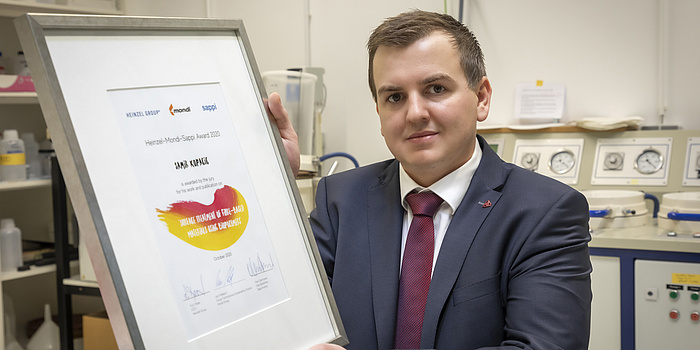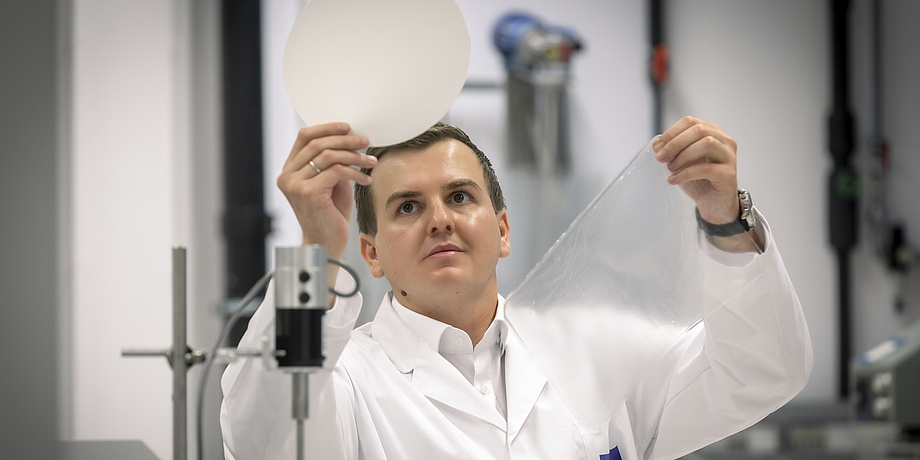"We currently have nearly eight billion people on our planet. If we continue to consume as much plastic as we do now, we will have more and more non-biodegradable plastic waste in our environment and increasing CO2 levels in the atmosphere in the coming years," says Samir Kopacic, using drastic language to explain why he has chosen a career in green technology with a focus on process and material development. The 31-year-old works at the Institute of Bioproducts and Paper Technology and researches into how more bio-based materials and less plastic can be used in the field of food packaging. "A classic example for me is cereal packaging," he says. "It's made of cardboard and inside is a plastic bag." The bag, made of synthetic film, is used as a functional gas barrier, for example to keep the cereal flakes crispy and preserve the aroma. Alternatively, according to Kopacic, the cardboard could be coated with a bio-based film or foil that would have the same effect.
We currently have nearly eight billion people on our planet. If we continue to consume as much plastic as we do now, we will have more and more non-biodegradable plastic waste in our environment and increasing CO2 levels in the atmosphere in the coming years.
The young researcher is working on different multi-functional biopolymers that can be applied to paper or even completely replace plastic. "Most European countries are not oil producers, but in Austria, approximately 50 per cent of the land area is covered with forest – so it’s rich in sustainable and renewable biomass from which valuable biopolymers can be obtained," said the young researcher, explaining the economic as well as technological aspects behind his work.
The love of nature runs in the family
"From an academic point of view, I can do a lot with this topic because it is a mixture of technical chemistry and process engineering – in other words, it combines my two studies." Samir Kopacic was born in Gracanica, a small town in the north-eastern part of Bosnia and Herzegovina. He attended the international English-speaking secondary school and then studied Technical Chemistry and Chemical and Process Engineering at Graz University of Technology.
"I realized in secondary school that my strengths lay in science. Even then I was interested in experimental science subjects and the choice of studies was easy. The question was whether I should go in a technological, medical or natural science direction," he says, looking back. "My three-year-old daughter is exactly the same – she’s already very interested in plants, animals and micro-organisms."
I realized in secondary school that my strengths lay in science.
Besides his work, he devotes his free time to his family, friends and shared hobbies. He enjoys cooking for his daughter and his wife, who is also a chemist at TU Graz: "Yesterday, for example, we had chicken breast with a special cheese-like filling and various herbs," he reveals. Otherwise, he also spends every free minute with his family and out of doors, enjoys hiking and giving living room concerts with his daughter. “She’s just got a ukulele and I play guitar. We're not professionals, but there is potential," he says, smiling.
Heinzel-Mondi-Sappi Award for young researchers
In the future he would like to continue working in the technical field, develop his professional and personal skills and apply them in innovative fields. "Thanks to a wide range of academic qualifications and professional experience, I could imagine my future career in both academic and industrial fields," he says. "Together with project partners from industry and academia, I do a lot of applied research and am currently involved in an invention that’s going to be patented. Some of the results could be developed into products in the next few years." The Heinzel-Mondi-Sappi Award, which the young researcher received for his research activities in October 2020, shows that the Austrian paper and packaging industry shares this opinion. Kopacic himself is in any case firmly convinced "that we in Europe need a change of course in terms of plastics consumption and that we must focus on biomaterials in the future."

Samir Kopacic recived the Heinzel-Mondi-Sappi Award 2020 for his scientific work.
This research area is anchored in the Field of Expertise “Sustainable Systems”, one of five strategic foci of TU Graz.
You can find more research news on Planet research. Monthly updates from the world of science at Graz University of Technology are available via the research newsletter TU Graz research monthly.

